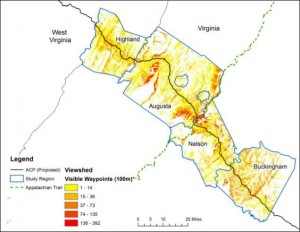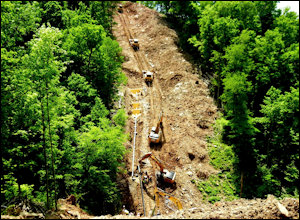by James A. Bacon
From the perspective of theoretical economics, the debate over the proposed Atlantic Coast Pipeline (ACP) is getting quite interesting: To what extent do natural gas pipelines diminish the value of property they cross?
A coalition of five community groups opposed to the pipeline contend that landowners along the proposed route will lose up to $141 million in lost property value and environmental benefits– and that doesn’t include long-term losses to economic development and tourism. That estimate comes from a study performed by Charlottesville-based Key-Log Economics LLC.
But Dominion Resources, managing partner of the pipeline project, cites Federal Energy Regulatory Commission (FERC) research that there is “no consistent information suggesting that the presence of a natural gas pipeline easement would decrease property values.” Pipelines co-exist with tourism, agriculture and residential development in many parts of the country, the company says.
The debate fascinates me because, as I have argued previously on this blog, the determinants of property value are changing. Fifty years ago, rural property was valued on the income stream that could be generated by farming the land or cutting timber. Today, income is a secondary consideration for many people living in the country. Increasingly, land owners value their property for scenic vistas and environmental preservation. But there is no consensus method for compensating property owners for those lost values in eminent domain disputes, such as the uproars in Virginia over the proposed ACP and Mountain Valley Pipeline.

Viewshed impact of proposed Atlantic Coast Pipeline route through Highland, Augusta, Nelson and Buckingham Counties. Source: Key-Log Economics LLC study.
The Key-Log Economics study focused on a study region of four counties — Highland, Augusta, Nelson and Buckingham — in the path of the proposed ACP route. The area is one of the more economically vigorous non-metropolitan areas in Virginia, the study says. The area has a higher human amenity index (based on scenic amenities, recreational resources and access to health care), more investment income per capita and more entrepreneurship than most Virginia counties. Between 2000 and 2014, population grew 8.5% compared to a 0.2% loss for non-metro Virginia. Growth in employment and measures of personal income grew significantly faster as well.
“Trends suggest that entrepreneurs and retirees are moving to (or staying in) this region. They bring their income, their expertise, and their job-creating ability with them,” states the study. “Just as retirees and many businesses can choose where to locate, visitors and potential visitors have practically unlimited choices for places to spend their vacation time and expendable income. If the study region loses its amenity edge, other things being equal, people will go elsewhere, and this region could contract. … The ACP could tip the region into a downward spiral.”
The perception of safety risk from gas explosions will negatively impact property values along the route, as will proximity to the noisy compression station proposed for Buckingham County, the report says. Additionally, the loss of “million-dollar” views will diminish property values, and the loss to pipeline construction of “ecosystem services” such as clean water filtration could cost communities millions of dollars to replace their water supply.
Under the Key-Log methodology, the biggest contributor to lost property values by far is “aesthetic value,” accounting for 71% to 79% of total losses. The pipeline would be visible to an estimated 31,000 parcels, diminishing property values from between $8.4 billion and $30.5 billion each year.
Dominion responds that the Key-Log report “lacks factual basis and credibility.” Neighboring counties in Virginia have pipelines but haven’t seen any of the impacts Key-Log describes. Said Media Relations Manager Aaron Ruby in a prepared statement:
There are many examples in Virginia and around the country where tourism, agriculture and residential development co-exist alongside natural gas pipelines. In California’s Napa Valley, for example, hundreds of miles of natural gas transmission pipelines operate through one the most successful tourist, agricultural and wine-producing regions of the country.
Here in Virginia is more proof. For several decades a major natural gas pipeline has safely operated alongside many farms, homes and businesses in Augusta County. Far from inhibiting the economy or residential development, the pipeline passes through shopping center parking lots and in between new housing subdivisions. That pipeline extends into neighboring Albemarle County, where it passes through White Hall Vineyards, which for more than 20 years has been a successful tourist destination and producer of award-winning wine. In Fluvanna County, four major natural gas pipelines have operated for decades through the Lake Monticello residential development, which attracts vacationers, retirees and outdoor enthusiasts from across Virginia.
Dominion cited the 2014 Final Environmental Impact Statement for the Constitution Pipeline in New York, which concluded that there was no solid information suggesting that natural pipelines decreased property values. (Key-Log dedicated more than two pages in its report disputing the findings of that study.)
Other Dominion-commissioned studies found that the pipeline would result in almost $38 million in economic activity, support 1,300 jobs and, by 2022, generate $10.4 million in local tax revenue in 13 counties and cities along the route.
Bacon’s bottom line: These are weighty issues. In the abstract,, Key-Log’s economic logic makes sense to me (although its calculations of lost economic value entail numerous assumptions that I have not examined). On the other hand, Dominion has a point — Virginia has as many miles of natural gas pipeline as it does Interstate highways, but the existing pipelines haven’t sucked the life out of the state.
Perhaps one way to approach the problem is to conduct a thought experiment. What would happen if someone waved a magic wand and made an existing pipeline disappear? Would we see a leap in property values along the no-longer-existent route? That’s hard to imagine. Unlike electric transmission lines, pipelines are so unobtrusive that I can’t even think of where one is located. And that says a lot.



